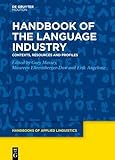Handbook of the Language Industry : Contexts, Resources and Profiles / ed. by Gary Massey, Maureen Ehrensberger-Dow, Erik Angelone.
Material type: TextSeries: Handbooks of Applied Linguistics [HAL] : Communication Competence. Language and Communication Problems. Practical Solutions ; 20Publisher: Berlin ; Boston : De Gruyter Mouton, [2024]Copyright date: 2024Description: 1 online resource (IX, 504 p.)Content type:
TextSeries: Handbooks of Applied Linguistics [HAL] : Communication Competence. Language and Communication Problems. Practical Solutions ; 20Publisher: Berlin ; Boston : De Gruyter Mouton, [2024]Copyright date: 2024Description: 1 online resource (IX, 504 p.)Content type: - 9783110715927
- 9783110716115
- 9783110716047
- 418/.02 23//eng/20240620eng
- online - DeGruyter
- Issued also in print.
| Item type | Current library | Call number | URL | Status | Notes | Barcode | |
|---|---|---|---|---|---|---|---|
 eBook
eBook
|
Biblioteca "Angelicum" Pont. Univ. S.Tommaso d'Aquino Nuvola online | online - DeGruyter (Browse shelf(Opens below)) | Online access | Not for loan (Accesso limitato) | Accesso per gli utenti autorizzati / Access for authorized users | (dgr)9783110716047 |
Frontmatter -- Preface to the Handbooks of Applied Linguistics Series -- Contents -- Introduction: Contextualizing language industry studies -- Part 1: Contexts and technological resources -- Chapter 1 Charting the language industry: Interview with an industry observer -- Chapter 2 Evolution of the language industry -- Chapter 3 The institutional language industry: Intercultural mediation at the European Parliament -- Chapter 4 Artificial intelligence, automation and the language industry -- Part 2: The human factor: Professional profiles -- Chapter 5 MT developers -- Chapter 6 Language technology developers -- Chapter 7 Translation and localization project and process managers -- Chapter 8 Terminology managers -- Chapter 9 Revisers and post-editors: The guardians of quality -- Chapter 10 Video game localizers -- Chapter 11 Transcreation: Beyond translation and advertising -- Chapter 12 Audiovisual translators -- Chapter 13 Media accessibility specialists -- Chapter 14 Legal translator profiles -- Chapter 15 Technical translators -- Chapter 16 Translators in medical and health settings -- Chapter 17 Heritage tourism translators -- Chapter 18 Language awareness in humanitarian responses -- Chapter 19 Distance interpreting as a professional profile -- Chapter 20 Conference interpreting in AI settings: New skills and ethical challenges -- Afterword -- Contributors to this volume -- Index
restricted access online access with authorization star
http://purl.org/coar/access_right/c_16ec
Digital transformation and demographic change are profoundly affecting the contexts in which the language industry operates, the resources it deploys and the roles and skillsets of those it employs. Driven by evolving digital resources and socio-ethical demands, the roles and responsibilities deriving from the proliferation of new and emerging profiles in the language industry are transcending the traditional bounds of core activities and competences associated with prototypical concepts of translation and interpreting. This volume focuses on the realities in the language industry from the fresh perspective of current and emerging professional profiles and of the contexts and resources that condition and support them. It traces the industry's evolution, maps its current state and considers key aspects of its workplaces, actors and practices. In an age when artificial intelligence is challenging traditionally held views of human performance, it addresses the issue of where and how human agents add value to the industry's processes and products, with a detailed, research-based consideration of the activities, competences, roles, responsibilities and tools that characterize the language industry of today and the near future.
Issued also in print.
Mode of access: Internet via World Wide Web.
In English.
Description based on online resource; title from PDF title page (publisher's Web site, viewed 20. Nov 2024)


